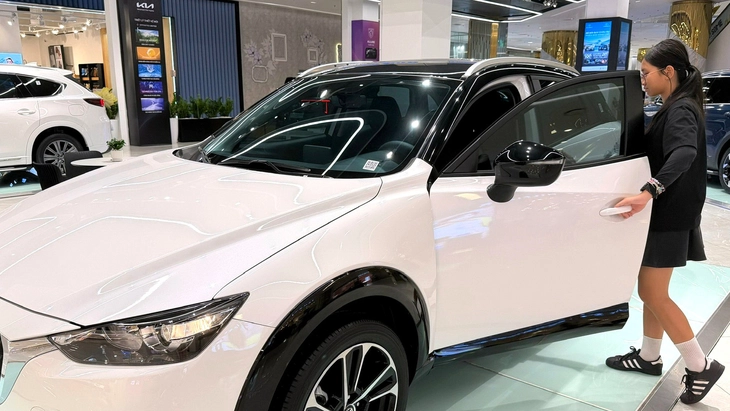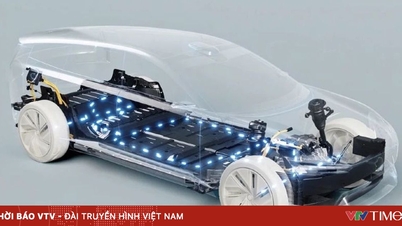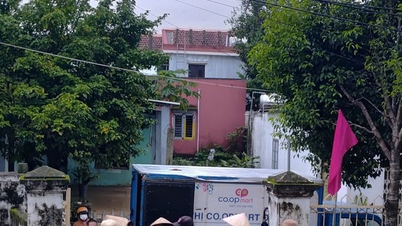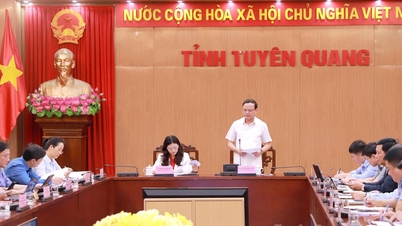
Many hybrid car models launch good price policies in October 2025 - Photo: N.BINH
Before the application, the auto market was "holding its breath waiting for the right time" with many dealers displaying large displays and big promotions, but customers were hesitant to wait for further discounts. Companies like Toyota, Honda, Suzuki... were rushing to pour thousands of billions of capital into expanding investment and assembling hybrid cars instead of pure electric cars, why?
Businesses "clear inventory", buyers wait for the right time
According to car dealers, the main reason is that buyers are "waiting" for the revised special consumption tax (SCT) policy, which will take effect from January 1, 2026.
Under the new law, hybrid vehicles, including both self-charging (HEVs) and plug-in hybrids (PHEVs), will be taxed at 70% the rate of conventional gasoline vehicles. Currently, only PHEVs enjoy this tax incentive, while HEVs are still taxed at the same rate as gasoline or diesel vehicles.
When the new policy takes effect, HEV prices will drop sharply thanks to the reduction of special consumption tax, value added tax (VAT) and registration fees. Preliminary calculations show that hybrid car buyers from the beginning of 2026 can save up to hundreds of millions of VND compared to now.
Therefore, from now until the end of 2025, car manufacturers and dealers will begin to "clear inventory" of hybrid cars to reduce the risk of inventory before new car prices are adjusted down.
In Ho Chi Minh City, Honda sales staff said the number of customers interested in CRV and Civic hybrids doubled in October, but "most only asked about the price and made deposits to reserve a spot, but did not sign a contract."
Mr. Nguyen Hoang Minh (HCMC) said: "If I buy now and next year the car is a hundred million cheaper, I will regret it. I will wait for 2026, which will have a new price and a sure policy."
According to car price records in October 2025, the wave of hybrid car price reductions spread throughout the market. Kia Sorento HEV Premium 2023 reduced by 260 million VND, to 1.139 billion VND; Signature version reduced by 292 million. Sorento PHEV Premium reduced by nearly 400 million VND, to 1.261 billion VND.
Toyota supports 50% of registration fee, equivalent to a reduction of 38-77 million for Corolla Cross, Yaris Cross, Camry hybrid. Honda CR-V hybrid is reduced by nearly 50 million, to 1,209 billion VND; Civic hybrid is 900 million after registration fee incentives.
Suzuki XL7 hybrid reduced the fee equivalent to 100% (about 70 million), the actual price is 530 million VND, with a free 3.5-year maintenance package. Haval H6 HEV from China reduced 356 million, to 740 million; Jaecoo J7 hybrid reduced from 969 million to 889 million VND.
According to dealers, this is the largest stock clearance of hybrid cars in the past 5 years, both to make way for the 2025-2026 generation of cars and to avoid risks when new prices are lower.
Why are customers not interested in hybrid cars?
Ms. Nguyen Thanh Huyen, Binh Thanh Ward, Ho Chi Minh City, said she likes hybrid cars because they save gas and don’t need to be charged like electric cars. However, she is still worried about the battery degrading after a few years. If the warranty is longer, she will consider it.
Since Toyota launched the Corolla Cross hybrid in 2020, the gasoline-electric hybrid car line has been considered a "reasonable transition" between traditional gasoline cars and future electric cars. However, after four years, the number of hybrid cars sold in Vietnam is still quite modest.
According to Mr. Nguyen Thanh Tuan, an auto technical consultant in Ho Chi Minh City, there are three main reasons why this type of car is not popular. The first is the selling price. Hybrid cars are usually about 150 - 300 million VND more expensive than the same type of gasoline car, causing many consumers to hesitate.
Second is the concern about maintenance costs, especially battery replacement. Companies like Toyota, Honda or Suzuki all guarantee batteries for 8 years or 160,000km. Meanwhile, the cost of battery replacement depending on the car model can be up to 40 - 100 million VND, making buyers worry about long-term costs.
Third is the habit of using gasoline cars. Vietnamese people still prefer gasoline engines because they are easy to maintain and resell, while hybrid is still a new technology for most consumers.
Accelerating investment in hybrid vehicle assembly in Vietnam
While consumers are still exploring, car companies are preparing to enter a new phase.
Mr. Nakano Keita - General Director of Toyota Vietnam - said the company will invest more than 360 million USD (about 9,500 billion VND) to upgrade the factory and build the first hybrid vehicle assembly line in Vietnam, located in Phu Tho (formerly Vinh Phuc province).
According to Mr. Nakano, hybrid vehicles will be the spearhead of Toyota’s green vehicle strategy in the Vietnamese market. Domestic production will help reduce costs, proactively control supply and expand market scale.
Currently, Toyota Vietnam has a factory with a capacity of 47,000 vehicles/year, assembling the Vios, Fortuner, Veloz Cross and Avanza Premio models. When the hybrid line comes into operation, Toyota will become the second company to assemble hybrid cars in the country, after Kia with the Sorento and Carnival HEV models.
According to Toyota, the choice of which car line to develop in Vietnam depends on the target of reducing emissions, economic efficiency and consumer acceptance, in the context of charging station infrastructure and electric vehicle prices remaining challenges.
The company believes that self-charging hybrid vehicles (HEVs) are a suitable solution, both fuel-efficient and independent of charging infrastructure. Toyota predicts that the electrification of Vietnam's automobile industry will take place strongly in the next 5-10 years, and hybrids will play an important "stepping stone" role before pure electric vehicles dominate.
Toyota is currently distributing 6 hybrid models in Vietnam, with cumulative sales in 2025 reaching 5,739 vehicles, accounting for 20% of the market share of HEV vehicles, up 91% over the same period last year. After nearly 5 years, about 20,000 Toyota hybrid vehicles have reached Vietnamese customers.
Not only Toyota, Suzuki Vietnam is also preparing for the electrification trend. The company representative said that while the launch of pure electric vehicles is still in the long-term plan, hybrids will be the focus in the current phase.
Suzuki has shown off the eVitara electric SUV at recent events, but has not set a date for commercialization. Instead, the company is focusing on expanding its hybrid vehicle portfolio with models such as the XL7 Hybrid, New Swift, and the upcoming Fronx GLX and GLX Plus versions.
According to Suzuki, this orientation is consistent with the Ministry of Construction 's proposal on average fuel consumption of 4.83 liters/100km, while helping users access fuel-saving technology without having to change their vehicle usage habits.
Assessing the hybrid and pure electric car market, speaking with Tuoi Tre, Mr. Thai Van Toan - Senior Executive Director in charge of business and after-sales of Isuzu Vietnam - said that the company is carefully studying the infrastructure in each country from charging stations, maintenance, battery recycling to the affordability of businesses before deciding to manufacture or distribute.
"When conditions are suitable, Isuzu Vietnam can assemble electric vehicles right at the existing factory without having to invest from the beginning," said Mr. Toan.
The market is waiting for hybrid cars to reduce prices.
According to the Vietnam Automobile Manufacturers Association (VAMA), in the first 8 months of 2025, the market consumed 8,414 hybrid vehicles, an increase of more than 80% over the same period last year. Toyota continued to lead with 4,907 vehicles, accounting for 58.3% of the market share, far surpassing Honda and Suzuki.
Experts predict that 2026 could be a "pivotal year" for hybrid cars in Vietnam, as prices decrease, domestic supply appears, and users gradually gain more confidence in this technology.
However, that "drop point" depends not only on tax policy but also on consumer confidence, after-sales service and long-term strategy of each car company.
Source: https://tuoitre.vn/thi-truong-o-to-hybrid-nin-tho-truoc-ngay-giam-thue-muc-giam-co-the-ca-tram-trieu-dong-20251031225148687.htm




![[Photo] Closing of the 14th Conference of the 13th Party Central Committee](https://vphoto.vietnam.vn/thumb/1200x675/vietnam/resource/IMAGE/2025/11/06/1762404919012_a1-bnd-5975-5183-jpg.webp)











































































































Comment (0)